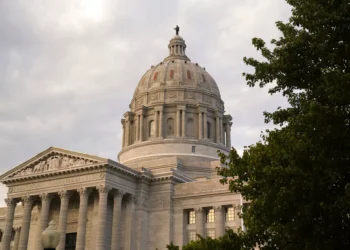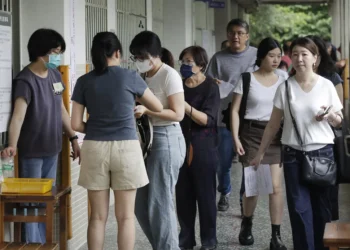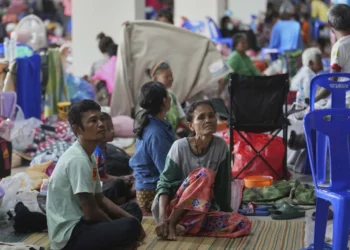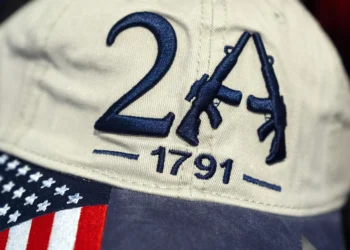On Friday afternoon’s MSNBC’s Chris Jansing Reports, the host lamented over the Trump administration’s decision to shut down the LGBTQ support option on the National Suicide Support hotline.
Jansing, along with guest and Trevor Project CEO Jaymes Black, were outraged that the hotline was poised to be removed from the suicide prevention service, as if the entire suicide prevention hotline program was being shut down:
The Trump administration is shutting down an LGBTQ suicide prevention hotline, as statistics show that LGBTQ young people are four times more likely to contemplate suicide, with trans teens at highest risk.
In a statement announcing the decision, the Substance Abuse and Mental Health Services Administration notably removed the T, which represents the trans community, ‘the 988 suicide and crisis lifeline will no longer silo LGB+ youth services, also known as the ‘press three option’ to focus on serving all help seekers, including those previously served through the press three option.
Jansing then questioned Black regarding the impact of the removal of the hotline, to which Black compared LGBTQ+ mental health issues to that of combat veterans (click “expand”):
JANSING: Yeah, I want to talk about that because they say– this is what the Trump administration says– look, they can still call the generalized hotline. What do you say?
BLACK: I say no. So, for example, when a veteran calls their specialized hotline, they need to speak to someone who understands military stress–
JANSING: PTSD–
BLACK: PTSD, family separation, combat stress. When an LGBTQ+ youth calls the line, they need someone who understands LGBTQ+ youth stress and trauma such as family rejection, homelessness. That is exactly why we had these specified lines with tailored interventions created, because tailored interventions actually increase their survival rate.
Jansing posed a good question, though veiled as a devil’s advocate point. Anyone suffering from suicidal thoughts or mental health issues can still dial 988 and be connected to a specialized mental health professional. So, why is it so egregious that the LGBTQ+ hotline is being done away with? Black failed to provide a distinct and direct answer, other than an attempted comparison to the mental health of veterans.
What the segment failed to mention was that this cut was most likely a mix of priority, staffing, and budget concerns. Early this year, the hotline’s funds had been steadily declining since the 988 number went live in 2022 due to the sudden surge of availability. The hotline was facing being cut altogether in April of 2025.
The hotline was a center for various mental health issues. The “press one” option directed callers to the Veterans Crisis Line, a service specialized in helping veterans with suicidal thoughts or PTSD episodes.
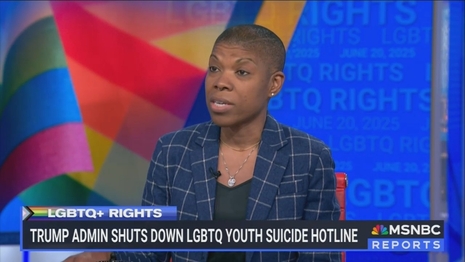 Among veterans, they are 58 percent more likely to commit suicide compared to those who haven’t served. For LGBTQ+ youth, that number is smaller, resting just above 20 percent when compared to heterosexual youth. Additionally, the veteran hotline is used by over 10,000-40,000 more unique callers per month than the LGBTQ+ youth hotline. Based on those numbers alone, it seemed like the cut was necessary in order to ensure the continuation of the service.
Among veterans, they are 58 percent more likely to commit suicide compared to those who haven’t served. For LGBTQ+ youth, that number is smaller, resting just above 20 percent when compared to heterosexual youth. Additionally, the veteran hotline is used by over 10,000-40,000 more unique callers per month than the LGBTQ+ youth hotline. Based on those numbers alone, it seemed like the cut was necessary in order to ensure the continuation of the service.
The LGBTQ+ youth specific hotline was the “press three” option. The service was part of a government contract advocated for by The Trevor Project, and grew to provide services from seven other LGBTQ+ youth non-profit organizations. The Trevor Project is a controversial LGBTQ+ youth non-profit specializing in providing teens and young adults with “resources” to affirm their gender identity. One of the most controversial features on the site is the chat option. Users, of which the most active age block is 12-15 years old, have the ability to anonymously chat with a self-described crisis counselor about issues ranging from questions with gender identity to suicidal thoughts.
What makes the feature so controversial is its “quick escape” option. Visitors to the site can click the escape key on their keyboard three times to quickly exit the window, and the chat automatically self-deletes itself from the user’s browsing history. This feature raised concerns among parents, who believed that the website was encouraging secrecy between teens and their families.
When asked if people will die, Black assertedly declared, “Absolutely. I don’t — I do not want to sugarcoat this,” she huffed, “This is a fatal decision and it’s going to create a significant care gap with the youth who depend on these services year in and year out.”
The entire transcript is below. Click “expand” to read.
MSNBC’s Chris Jansing Reports
June 20, 2025
1:51:22 PM ESTCHRIS JANSING: The Trump administration is shutting down an LGBTQ suicide prevention hotline, as statistics show that LGBTQ young people are four times more likely to contemplate suicide. With trans teens at highest risk.
In a statement announcing the decision, the substance abuse and mental health services administration notably removed the T, which represents the trans community, “the 988 suicide and crisis lifeline will no longer silo LGB+ youth services, also known as the ‘press three option’ to focus on serving all help seekers, including those previously served through the press three option.”
The CEO of the Trevor project, the organization contracted to create and help run the hotline, calls this a devastating decision. They join me now.
Jaymes Black, welcome. We should tell people Donald Trump signed the legislation that created this specialized service in the first place. So what’s changed?
JAYMES BLACK: That is correct. This legislation and the specialized services was signed in October 2020 as part of the National Suicide Hotline Designation Act. And as part of that act, HHS, they were directed to develop specialized strategies for high risk communities– veterans, Spanish speakers, and LGBTQ+ youth. And this was an evidence based, data backed decision, and it had strong bipartisan support, and everyone was so proud of it. And for the past five years, congress has approved these funds over and over again without fail.
What’s changed? What’s changed is that folks do not understand the statistics that you just read off. People have forgotten–
JANSING: Well, let’s–
BLACK: – Let’s go to that.
JANSING: Yeah, I want to talk about that because they say– this is what the Trump administration says– look, they can still call the generalized hotline. What do you say?
BLACK: I say no. So, for example, when a veteran calls their specialized hotline, they need to speak to someone who understands military stress–
JANSING: PTSD–
BLACK: PTSD, family separation, combat stress. When an LGBTQ+ youth calls the line, they need someone who understands LGBTQ+ youth stress and trauma such as family rejection, homelessness. That is exactly why we had these specified lines with tailored interventions created, because tailored interventions actually increase their survival rate. And this is not about a special line or special treatment. This is about effective treatment.
(…)
1:54:39 p.m. Eastern
JANSING: Will people die, do you think?
BLACK: Absolutely. I don’t I do not want to sugarcoat this. This is a fatal decision and it’s going to create a significant care gap with the youth who depend on these services year in and year out.




